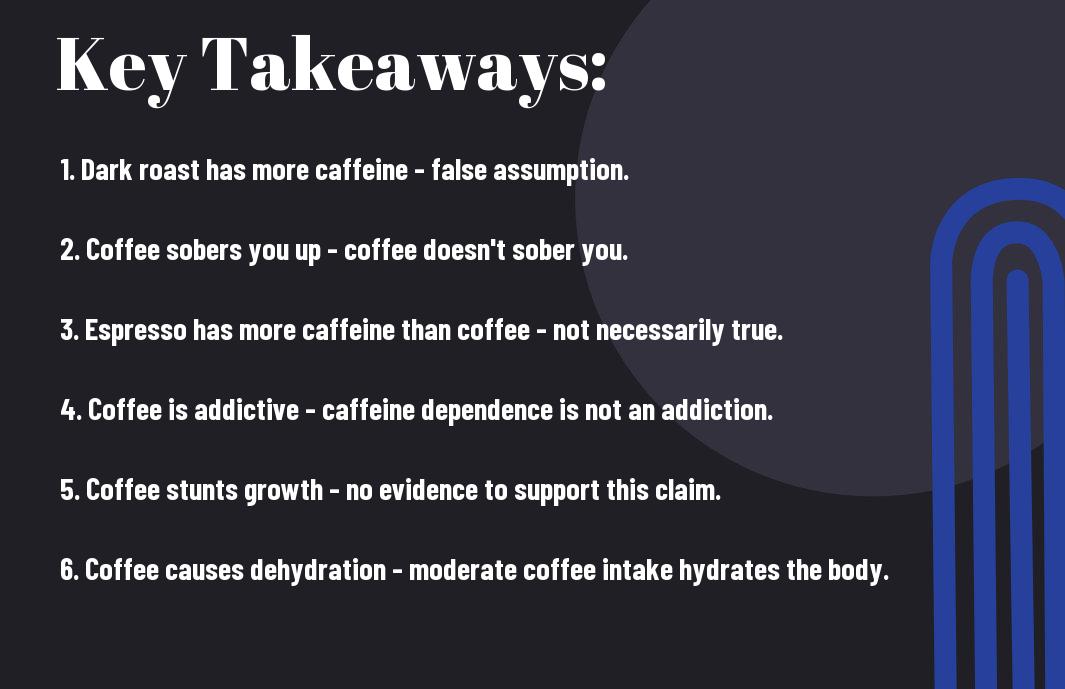You may have heard many things about coffee, but have you ever stopped to question if they are actually true? Let’s debunk some common coffee myths and get to the bottom of what’s real and what’s just a tall tale. Strap in for a journey into the world of coffee truths and falsehoods.
Key Takeaways:
- Myth: Dark roast coffee has more caffeine.
Truth: Dark roast coffee actually has less caffeine than light roast coffee because the roasting process burns off some of the caffeine content. - Myth: Coffee dehydrates you.
Truth: While coffee is a diuretic, it does not necessarily dehydrate you if consumed in moderation. The water content in coffee can still contribute to your daily hydration. - Myth: Espresso has more caffeine than regular coffee.
Truth: Contrary to popular belief, espresso actually has less caffeine per serving than regular brewed coffee. The intensity of espresso flavor can mistakenly suggest higher caffeine content.
The Myths Surrounding Coffee’s Origins
Before exploring the truth behind the origins of coffee, it is important to debunk some of the common myths that have circulated over the years. Coffee’s history is shrouded in myth and legend, but by examining the facts, we can uncover the real story behind this beloved beverage.
The Ethiopian Legend
Origins: One of the most popular myths surrounding coffee’s origins is the Ethiopian legend of Kaldi, a goat herder who discovered the stimulating effects of coffee beans after noticing his goats becoming more energetic upon consuming them. While this tale is charming, the true origin of coffee is a bit more complex and involves a combination of historical facts and legends.
The Arabian Peninsula Connection
Legend: Another prevalent myth is that coffee was discovered on the Arabian Peninsula by Sufi mystics who used it to stay awake during their religious rituals. While it is true that coffee cultivation spread from the Arabian Peninsula to other parts of the world, the idea that it was exclusively discovered there is not entirely accurate.
Connection: The Arabian Peninsula did play a crucial role in the early history of coffee, with coffee houses known as “qahveh khaneh” becoming social hubs for intellectual exchange and discussion. However, it is important to recognize that the journey of coffee from its discovery to becoming a globally consumed beverage involved various regions and cultures.
Debunking the Health Myths
Even though coffee has been enjoyed for centuries, there are still many health myths surrounding this beloved beverage. Let’s uncover the truth behind some of the most common misconceptions.
Coffee Causes Heart Disease
Myths about coffee causing heart disease have long been perpetuated, but research has shown that moderate coffee consumption is not linked to an increased risk of heart disease. In fact, some studies suggest that coffee may have heart-protective benefits due to its antioxidant properties. So, feel free to enjoy your daily cup of joe without worrying about your heart health.
Coffee Stunts Growth
Debunking the myth that coffee stunts growth is crucial, especially for parents concerned about their children’s development. While caffeine can temporarily inhibit calcium absorption, it does not have a significant impact on overall growth. As long as coffee consumption is moderate, there is no need to worry about it affecting height or development.
Causes of stunted growth are usually related to genetics, nutrition, and overall health rather than moderate coffee consumption. So, you can sip your coffee confidently, knowing that it won’t hinder your growth or that of your children.
Coffee Leads to Dehydration
Heart health is a significant concern for many individuals, and the misconception that coffee leads to dehydration can be alarming. However, the diuretic effect of caffeine in coffee is minimal when consumed in moderation. While excessive caffeine intake can lead to mild dehydration, a few cups of coffee a day will contribute to your daily fluid intake rather than deplete it.
Growth is a complex process influenced by various factors, and blaming coffee for stunting growth is not supported by scientific evidence. As long as coffee consumption is balanced with a healthy diet and lifestyle, there’s no need to fear that it will impact your growth or overall health negatively.
Separating Fact from Fiction: Caffeine Content
Despite what many people believe, not all coffee beverages have the same amount of caffeine. Let’s debunk some common myths surrounding caffeine content in coffee.
The Amount of Caffeine in Espresso vs. Drip Coffee
Fiction: One of the prevalent myths is that espresso has more caffeine than drip coffee. In reality, espresso actually has a higher concentration of caffeine per ounce compared to drip coffee. However, a typical serving size of espresso is much smaller than a standard cup of drip coffee. This means that in terms of overall caffeine content, a single serving of drip coffee typically contains more caffeine than a shot of espresso.
Than Does Dark Roast Have More Caffeine Than Light Roast?
Than: Another common misconception is that dark roast coffee has more caffeine than light roast coffee. The truth is that the roasting process actually burns off some of the caffeine in the beans. Therefore, light roast coffee beans generally retain slightly more caffeine compared to dark roast beans.

The Impact of Brewing Methods on Flavor
The French Press Myth: Does it Really Make Coffee Taste Bitter?
Myth: One common misconception is that using a French press to brew coffee results in a bitter taste. While it’s true that French press brewing can sometimes lead to a stronger and fuller-bodied flavor due to the longer extraction time, bitterness is not guaranteed. The bitterness often associated with French press coffee can actually be attributed to the grind size and steeping time rather than the brewing method itself.
The Pour-Over Method: A Game-Changer or Overhyped?
Flavor: The pour-over method has gained popularity in recent years for its ability to extract nuanced flavors from coffee beans. Some coffee enthusiasts swear by the pour-over technique, claiming it brings out the subtleties of different coffee profiles that other methods may not achieve. While it does require a bit more hands-on attention and skill compared to automatic coffee makers, the pour-over method can be a game-changer for those seeking a customized and flavorful cup of coffee.
Taste: The pour-over method allows for more control over the brewing process, from water temperature to pouring technique, resulting in a coffee that is precisely tailored to your preferences. By adjusting variables such as grind size, water distribution, and brewing time, coffee drinkers can experiment with different flavor profiles and discover new dimensions of taste in their daily brew.

Coffee and Sleep: The Real Story
Many people believe that a cup of coffee before bed will disrupt their sleep patterns and leave them tossing and turning all night. However, the truth is a bit more nuanced. While it is true that caffeine is a stimulant that can interfere with your ability to fall asleep, the effects can vary greatly from person to person. Some individuals are more sensitive to caffeine than others and may find that even a small amount consumed in the afternoon can keep them up at night. It’s important to know your own body and how it reacts to caffeine to determine the best time to cut off your coffee intake.
Does Coffee Really Disrupt Sleep Patterns?
For some individuals, consuming coffee close to bedtime can indeed disrupt their sleep patterns. The stimulating effects of caffeine can stay in your system for several hours, making it harder to fall asleep and potentially reducing the overall quality of your rest. If you find that coffee affects your sleep, consider limiting your consumption to earlier in the day or opting for decaffeinated options later on.
Can Coffee Help You Power Through a Late-Night Work Session?
Workaholics rejoice – coffee can indeed help you power through a late-night work session. The caffeine in coffee can improve focus, alertness, and cognitive function, making it a popular choice for those burning the midnight oil. However, it’s important to be mindful of your caffeine tolerance and the potential impact on your sleep schedule. Finding the right balance between staying productive and ensuring you get enough rest is key to leveraging coffee as a late-night productivity tool.
Another thing to consider is the potential drawbacks of relying on coffee to push through late-night work sessions. While it can provide a temporary boost in energy and concentration, excessive consumption can lead to increased jitters, anxiety, and disrupted sleep patterns in the long run. It’s crucial to listen to your body’s cues and prioritize sustainable work habits for overall well-being.
The Economics of Coffee: Myths and Realities
Keep in mind that the coffee industry is complex, with a long supply chain involving multiple players, from farmers to roasters to retailers. One common myth is that coffee farmers are paid fairly for their labor.
Are Coffee Farmers Really Paid Fairly?
Economics: The reality is that many coffee farmers, especially in developing countries, struggle to earn a living wage from their coffee production. Fluctuating market prices, high production costs, and lack of bargaining power often leave farmers with minimal profits, leading to issues of poverty and economic instability within coffee-growing communities.
Does Fair Trade Certification Guarantee a Better Cup?
The Fair Trade certification is often seen as a marker of ethical and high-quality coffee. While it does aim to ensure that farmers receive a minimum price for their coffee and promotes sustainable farming practices, it does not necessarily guarantee a better-tasting cup.
It’s necessary to consider other factors like the coffee bean’s quality, the roasting process, and brewing method when looking for a delicious cup of coffee. While Fair Trade certification supports ethical practices, it’s not the only indicator of exceptional coffee.

Conclusion
Taking this into account, it is evident that there are numerous myths surrounding coffee that have been debunked. From the misconception that dark roast coffee has more caffeine to the belief that coffee stunts growth, it is important to separate fact from fiction when it comes to our favorite morning beverage.
By understanding the truth behind common coffee myths, we can appreciate and enjoy our coffee even more. It is crucial to stay informed and educated on the subject to make informed decisions about our coffee consumption. So, next time you hear a coffee myth, remember to question it and dig deeper to uncover the truth.
FAQ
Q: What are some common coffee myths?
A: There are several common myths surrounding coffee that have been debunked by science and research.
Q: Is it true that coffee stunts your growth?
A: This is a common myth that has been disproven. Drinking coffee in moderation does not have any impact on your growth.
Q: Does coffee sober you up?
A: No, coffee does not sober you up. It may help you feel more awake, but it does not reduce the effects of alcohol in your system.
Q: Is it true that coffee causes dehydration?
A: Contrary to popular belief, coffee does not dehydrate you. While it is a diuretic, the water content in coffee helps to hydrate you overall.
Q: Does coffee increase the risk of heart disease?
A: Moderate coffee consumption is not linked to an increased risk of heart disease. In fact, some studies suggest that it may have heart-protective benefits.





